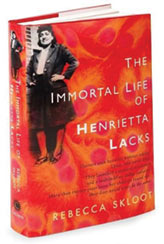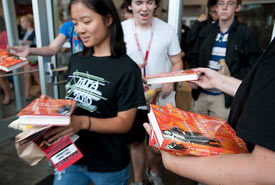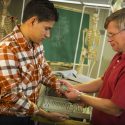Go Big Read kicks off another year with events
Last year’s freshman year of Go Big Read, the university’s common-reading program, was a success, as the campus and community read, discussed and, yes, disagreed about the selected book, “In Defense of Food” by Michael Pollan. The purpose of the program is to engage students, faculty, staff, alumni and community members in a shared, academically focused reading experience.

Rebecca Skloot, author of “The Immortal Life of Henrietta Lacks,” will visit campus this fall. In addition to her talk at 7 p.m. on Monday, Oct. 25, at the Kohl Center, she will visit classes and meet with students. The Kohl Center event is free and open to the public. No tickets are needed.
How to get a copy of “The Immortal Life of Henrietta Lacks.”
“The inaugural Go Big Read was everything I hoped it would be, engaging people from across campus and the community in discussions of important issues and ideas,” says Chancellor Biddy Martin.
“The Immortal Life of Henrietta Lacks” by Rebecca Skloot has been selected as the book for Go Big Read’s sophomore year. The book was chosen from a short list compiled by a review committee from nearly 160 titles nominated.
“In addition to being a great read, ‘The Immortal Life of Henrietta Lacks’ is cross-disciplinary and relevant, and will engage students and readers on a number of intellectual and personal levels,” says Martin.
Ken Frazier, director of UW–Madison Libraries and a member of the Go Big Read steering committee, also praised the choice.
“The book illuminates complex science by telling a compelling human story that is rich in moral issues, but author Rebecca Skloot wisely leaves it to the reader to sort out the ethical implications,” says Frazier. “It will inspire thought, conversation and, I hope, some controversy.”
The steering committee is not alone in its good judgment. Praise for the book keeps rolling in. Amazon named it one of the 10 best books of the year so far, calling it a must-read. National Public Radio named it one of the top five best of the bestsellers (the only nonfiction book in the top five). The book will be the October selection for Wisconsin First Lady Jessica Doyle’s online common-reading program for school-age children, Read On Wisconsin!
“In addition to being a great read, ‘The Immortal Life of Henrietta Lacks’ is cross-disciplinary and relevant, and will engage students and readers on a number of intellectual and personal levels.”
Chancellor Biddy Martin
Oh, and Oprah, Alan Ball (“True Blood” and “Six Feet Under”) and HBO are planning on making a film version of the book.
The story certainly is compelling.
Henrietta Lacks was a poor black woman in Baltimore who died in 1951 at age 30 from cervical cancer. Before her death, a sample of her cancerous tissue was taken without her knowledge or consent, standard procedure at the time. Skloot tells the story of what happened to her cells and the influence they had on medicine and her family.
Those cells could reproduce indefinitely without disintegration — a medical and scientific breakthrough. This development made research and key medical advances possible, including vaccines for polio and the human papillomavirus, treatments for leukemia and other drug developments, and uncovering information about cancer. Named HeLa, for HEnrietta LAcks, the cells have been made, bought and sold by the billions and created a profitable industry that manufactures and sells human biological materials.
Meanwhile, Lacks’ family lived in poverty and did not know about Henrietta’s “immortality” and the proliferation of and profit from her cells until 20 years after her death, when researchers began studying her husband and children, again without informed consent. Skloot spent 10 years researching and writing the book, eventually getting Lacks’ family to talk to her.
Go Big Read will, of course, cover the book’s personal stories and the journey of extraordinary scientific progress, but it will also grapple with the complex issues it raises: science, ethics, poverty, racism, ownership rights and the law. Not an abstract, the book confronts readers with questions close to campus — using human subjects, stem cell research, and codes of ethics for science and journalism, among others.

Volunteers hand out thousands of complimentary copies of “The Immortal Life of Henrietta Lacks” following the Chancellor’s Convocation for New Students at the Kohl Center on Sept. 1, 2010.
Photo: Jeff Miller
There are many ways to get involved and participate in Go Big Read. For students, some 5,000 copies were distributed at the Chancellor’s Convocation for New Students, and all students using the book as part of a class will also receive a free copy. In addition to classroom discussions, more will be held in residence halls.
The Go Big Read website has a calendar of all these events and a toolkit with discussion questions along with discussion guidelines for participants and facilitators; book reviews; profiles of Skloot and more background on the Lacks family; and a reminder of the Go Big Read program goals.
There’s even a marketing toolkit for people to use in planning their own event or discussion. Site visitors can follow Go Big Read on Facebook and Twitter and submit photos on Flickr.
A blog on the Go Big Read website has handy links to more resources on the book and links to news stories raised by the book, including a moving account of the dedication last May of a headstone at Lacks’ grave.
For those teaching the book, the Teaching and Learning Excellence website has curriculum ideas and a blog to connect with other instructors. Faculty and staff from the health sciences hope to engage hundreds of health sciences students through cross-disciplinary discussion sessions. Discussions are being planned for campus and they are already under way at city libraries.
Skloot will visit campus this fall. In addition to her talk at 7 p.m. on Monday, Oct. 25, at the Kohl Center, she will visit classes and meet with students. The Kohl Center event is free and open to the public. No tickets are needed.
Go Big Read does not end with the author’s visit; discussions and events are ongoing. Next spring, Henry Louis Gates Jr., director of the W.E.B. Du Bois Institute for African and African American Research at Harvard University, is slated to visit campus for a Nellie McKay Memorial Lecture; and a major campus and community event is being planned for the new Wisconsin Institutes for Discovery.
Tags: books, learning, student life

